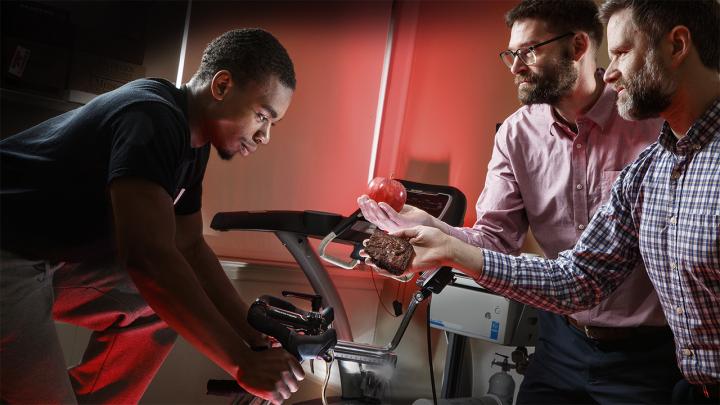
Credit: Craig Chandler, University of Nebraska-Lincoln
You’ve just exercised for an hour, tracking the burned calories with a sense of satisfaction. Then comes a choice: munch on an apple or indulge in the chocolatey goodness of a brownie?
A post-exercise snack can threaten to undo the gains (or losses) of a workout. But the decision itself may depend on when you make it, according to a new study from the University of Nebraska-Lincoln.
The takeaway? Avoiding delay can keep temptation at bay.
Nebraska’s Karsten Koehler, Christopher Gustafson and their colleagues conducted an experiment that asked two groups of participants to go about their normal workout routines while wearing motion-tracking accelerometers, supposedly to calibrate them.
Before exercising, members of one group decided whether they wanted an apple, brownie or no snack following the exercise session – an offer framed as a reward for calibrating the accelerometers. Members of the other group were presented with the same choice after they had already exercised.
Roughly 74 percent of participants who were asked prior to the workout session chose an apple, compared with 55 percent of those asked afterward – making the latter about one-third less likely to favor the fruit. And whereas just 14 percent of the pre-exercise group selected the brownie, about 20 percent of the post-workout group decided to indulge.
The findings suggest that simply committing in advance to a post-exercise snack may increase the odds of eating more nutritiously, the researchers said.
“We found that there was very little research on this very tangible thing that I think everyone can relate to,” said Koehler, assistant professor in the Department of Nutrition and Health Sciences. “If your goal is to lose weight, then I would say our findings support that you’re better off making the choice … not when you’re hungry after your workout, but instead before you go to the gym.”
That recommendation, and the data undergirding it, echoes broader research on the dynamics between timing and food choice. Prior studies have consistently shown that people are more willing to indulge when making immediate dietary decisions than when thinking ahead, said Gustafson, assistant professor in the Department of Agricultural Economics.
“Our study conformed very closely to the ideas in behavioral economics about this present-biased preference (for unhealthier options),” Gustafson said. “Using solely that model, I would’ve predicted that people would be more likely to choose the healthy snack when choosing before they exercise.”
The study’s design also put two other theoretical models to the test. One, known as compensatory eating, suggests that people consume more calorie-dense food in the aftermath of exercise to make up for calories expended during a workout. Yet the other model, exercise-induced anorexia, proposes that exercise can suppress appetite-related hormones and consequently lead people to eat less.
“There have been a lot of lab studies that have looked at appetite and hunger,” Koehler said. “Most of these studies have found that right after exercise, you seem to be less hungry. I’ve always looked at these studies and wondered: Does it have such a strong impact that you can use this window after you exercise to say, ‘Because I’m not hungry, I’m going to make a really good choice about what I eat’? But knowing myself and many other exercisers, there’s also the notion that after you exercise, you want to reward yourself.”
Despite the seeming contradiction, the team found indications of both. Though modest, the 6-percent increase in brownie choice between the pre- and post-exercise groups supported the notion of compensatory eating. And the evidence for exercise-induced anorexia was clear: The 12-percent fraction that declined a snack in the pre-exercise condition rose to 25 percent in the post-exercise group.
Plenty of questions remain, the researchers said. Did the rise in brownie choice stem more from the immediacy of the decision-making or the sway of compensatory eating? What differentiates those who exhibit compensatory eating vs. exercise-induced anorexia? Would a larger menu of options – one that better approximates a real scenario – alter the outcomes?
The answers may lie in more detailed experiments that Koehler, Gustafson and their colleagues are already busy conducting.
“We’re from two different academic backgrounds,” Gustafson said, “and I think both of our fields have a perspective on the questions that we’re looking at.”
The team reported its findings in the journal Nutrients. Koehler and Gustafson authored the study with Nebraska’s Ajai Ammachathram, assistant professor in the Department of Nutrition and Health Sciences; Nigina Rakhmatullaeva, graduate student in agricultural economics; Safiya Beckford, graduate student in nutrition and exercise physiology; and Alexander Cristobal, senior in nutritional science and dietetics.
###
The researchers received support from the University of Nebraska’s Food for Health Collaboration Initiative.
Media Contact
Karsten Koehler
[email protected]
402-472-7521
Original Source
https:/
Related Journal Article
http://dx.




